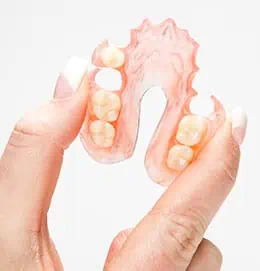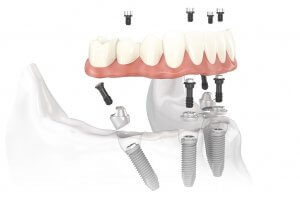Have you ever wanted to know how to make your dentures fit better? Or, maybe you are just used to ill-fitting dentures and didn’t realise you could make them fit more comfortably.
If your dentures don’t fit correctly they can not only cause you a lot of discomfort and insecurity but also impede your ability to speak and eat. But, don’t worry this article will answer all your questions about badly fitting false teeth, including:
- Why are my new dentures uncomfortable?
- How can I make my false teeth fit better?
- What is a denture reline?
- Should I use a denture adhesive?
- What are the alternatives to dentures?
Dentures are an affordable and common way to replace missing teeth. And, with our teeth having a big impact on our appearance and self-confidence, it’s important that they fit, and function correctly.
Your false teeth are here to stay, so it’s a good idea to make sure they fit well and don’t cause you any discomfort. Poorly fitting dentures can lead to a multitude of oral health issues, and affect your overall health.
Keep reading to find out how to make them fit better, or potentially fix any problems you may have with your removable teeth.
In This Article
Why are my new dentures uncomfortable?
If you have new dentures after teeth extractions they may be sore and uncomfortable because you aren’t used to them, or it might be that they just don’t fit correctly. If they don’t fit properly, to begin with, you may find dentures hard to get used to. Speak to your dentist if you think that is the case.

Take the time with your dentist to make sure your false teeth fit properly when you first get them. This will help them to feel comfortable once you are used to wearing them.
If your dentures used to be comfortable, but now they feel loose or are causing you discomfort then it may be from one of the following causes:
- Migration of your remaining natural teeth
- Bone recession
- Your denture has warped or changed shape
- Everyday wear and tear
Bone recession
The most common reason for ill-fitting or loose dentures is that your mouth may have changed shape, which is perfectly normal. Over time your gums can shrink due to bone recession, where the excess bone is reabsorbed. This occurs when there are no tooth roots present to stimulate bone growth.
Dentures have warped or changed shape
Care and maintenance of your false teeth can make them last longer. However, if you don’t follow correct care directions, or neglect your dentures then they may warp or alter in shape. Correct care includes not using boiling water to clean your dentures or leaving them in Steradent overnight.
Everyday wear and tear
Be careful with your false teeth and they will last a long time. Dentures are made to be durable but will break or bend if dropped onto a hard surface or placed under something heavy.
How do you make dentures fit better?

Poorly fitting dentures can be sore, uncomfortable and impractical. So, whatever the cause for your badly fitting dentures, it’s best to find a solution as soon as possible. The first step to resolving this problem is to contact your dentist and make an appointment.
Your dentist may suggest making adjustments to your dentures, depending on the material they are made from. It is a little harder to adjust chrome dentures in comparison to ones made from acrylic. Another option your dentist may suggest is a denture reline.
Denture reline
A denture reline is where your dentist adds a new layer of material to the base of your denture to help them fit better. This new layer will follow the contours of your mouth and gum line, making your denture fit snugly once again.

There are 3 different types of denture reline, depending on your needs:
- Soft reline: for patients with tender gums
- Hard reline: takes longer but is more durable
- Temporary reline: temporary while sore and inflamed gums heal
Once you have had your dentures relined, you can also use denture adhesive to keep them secure.
Can denture adhesive make your dentures fit better?
You may have questioned using denture adhesives in the past, as they do have some disadvantages. But, they can help make even the best fitting dentures feel more comfortable in your mouth. They can even inspire confidence that your dentures will stay put while chewing food or speaking.
Denture adhesive can also help you seal out food particles, so they don’t get stuck underneath your false teeth and irritate your gums. They are also an affordable way to help poorly fitting full, or partial dentures feel secure while you wait to see a dentist.
If you want to know more about the pros and cons of using denture adhesives, speak with a dental professional to see if they are right for you.
Care and maintenance
Care and maintenance won’t make your ill-fitting dentures magically fit again. However, it may prevent them from changing shape, warping, or breaking. This includes cleaning with the correct routine and products for your type of denture.
Cleaning your dentures daily can ensure plaque and food particles don’t build up and cause irritation or sore spots. And, cleaning them correctly means that they won’t wear down and change shape during the process.
Avoid eating hard food with your false teeth, as chewing certain foods can break your dentures. Instead, look for soft to medium food, and cut any of the more solid foods into small pieces before chewing.
Are there any alternatives to dentures?
If you are struggling to get your dentures to fit correctly no matter what you try then it might be time to consider an alternative. Some of the alternatives to dentures include:

- Dental implants
- Fixed dentures
- Bridges
- All-on-four implants
Dental implants are the closest solution to replacing your missing teeth with the real thing. They are more expensive than dentures, and you have to go to a private practice for them as they are not available on the NHS.
Conclusion
If your dentures feel loose or are causing you pain, you might want to try and make them fit better. Badly fitting dentures can cause a number of oral health problems, so it’s best if you can find a solution as soon as possible. Always speak to your dentist first, in case you need some adjustments to your denture.
There are a few ways you can make your dentures fit better. Your dentist can do a denture reline, or another option is to find a good dental adhesive that will hold your removable teeth tightly to your gums.
Taking good care of false teeth can potentially keep them comfortable for longer, as well as make them last longer. Knowing how to properly maintain them will prevent them from warping, or changing shape.
NHS. Dentures (false teeth). Consulted 16th June 2021.
Dental Health. Denture Care Guidelines. Consulted 16th June 2021.




